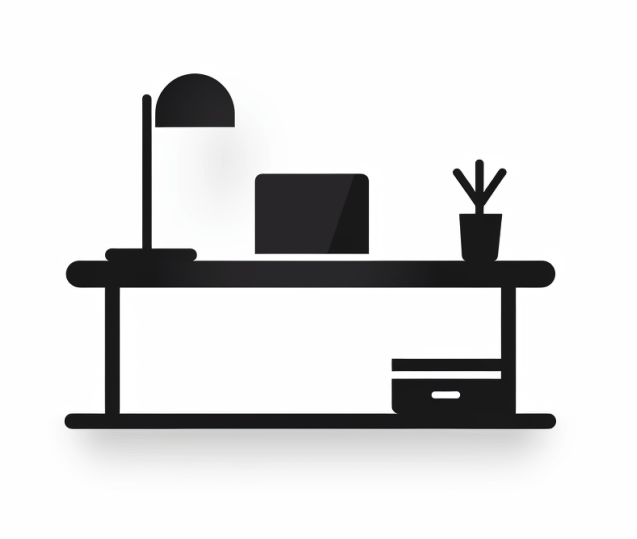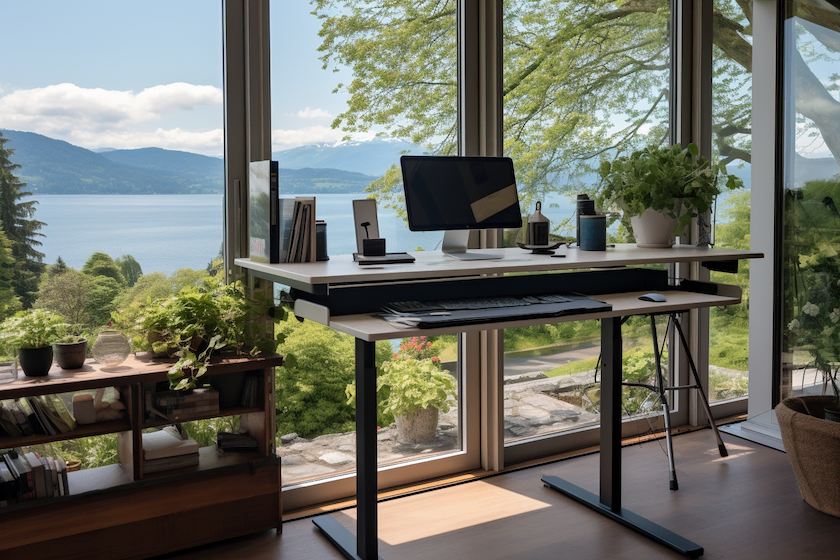Why Choose a Standing Desk?
In contrast to traditional sit-down desks, standing desks have been linked with a plethora of physical and mental benefits. They promote better posture, burn more calories, and reduce the risk of weight gain and heart disease. Furthermore, they increase productivity and ease back pain, keeping you active, energized, and focused during your working hours.
Factors to Consider When Choosing a Standing Desk
When selecting a standing desk for your home office, keep these factors at the top of your mind:
1. Ergonomics
A crucial aspect of any standing desk is its ergonomic design. Look for desks with adjustable heights, allowing you to find the perfect positioning for your wrists and monitor. Consider features such as built-in keyboard trays or monitor mounts to maximize comfort and minimize strain on your body.
2. Weight Capacity
Ensure your chosen standing desk can handle the weight of your equipment, including your computer, monitors, and other office essentials. Look for desks with a higher weight capacity to ensure stability and longevity.
3. Durability and Stability
Stability is key when it comes to standing desks. Look for desks made from sturdy materials like steel or solid wood. Additionally, check for features like anti-wobble mechanisms or crossbars that contribute to overall stability.
4. Space and Storage
Consider the surface area and storage options that a standing desk provides. Evaluate whether the desk has enough space for your work essentials, such as monitors, documents, and office supplies. If storage is essential, look for desks with built-in drawers or shelves.
5. Assembly and Installation
Some standing desks require more complex assembly than others. Consider your comfort level with DIY projects and choose a desk that matches your skills and available time. Look for desks that come with clear instructions and necessary tools for easy installation.
6. Aesthetic Appeal
Since your home office is a part of your living space, it's important to choose a standing desk that complements your overall interior design. Look for desks available in different finishes and styles to match your personal taste.
7. Price
As with any purchase, determining your budget is crucial. While standing desks can range in price, it's important to strike a balance between quality and affordability. Consider the long-term benefits and durability of the desk when evaluating its worth.
By considering these factors, you can make an informed decision and find the perfect standing desk that suits your home office needs.
Bringing Ergonomics to Your Home Office
Investing in a standing desk is just the first step towards a more ergonomic home office setup. Here are a few additional tips to optimize your workspace:
- Use an ergonomic chair or a balance ball chair to provide proper support and alignment for your spine while alternating between sitting and standing.
- Place a floor mat or anti-fatigue mat beneath your standing desk to reduce pressure on your legs and feet.
- Arrange your desk in a way that places your monitor at eye level, allowing you to maintain good posture and reduce strain on your neck and shoulders.
- Consider using a standing desk converter or monitor arm to easily adjust the height and angle of your monitor for optimal viewing.
- Incorporate movement into your work routine by taking regular breaks, stretching, and engaging in short bursts of physical activity throughout the day.
Remember, making your home office ergonomic is all about creating a workspace that promotes comfort, productivity, and overall well-being.
Frequently Asked Questions About Standing Desks for Home Offices
- Q: Can standing desks help with back pain? A: Yes, standing desks can help alleviate back pain by promoting better posture and reducing the strain on your lower back. However, it's important to find the right balance between sitting and standing, as prolonged standing can also lead to discomfort. Consider using an anti-fatigue mat and alternating between sitting and standing throughout the day.
- Q: Are standing desks suitable for everyone? A: Standing desks can benefit most individuals, but they may not be suitable for everyone. Those with certain health conditions, such as varicose veins or joint problems, should consult with a healthcare professional before using a standing desk. Additionally, individuals with balance or stability issues may need to exercise caution while using a standing desk and ensure they have adequate support.
- Q: Can I use a standing desk without any fatigue or discomfort? A: While standing desks offer numerous benefits, it's essential to listen to your body and make adjustments as needed. Fatigue or discomfort may occur if you stand for long periods without taking breaks or using proper ergonomics. Incorporating regular sitting breaks, using an ergonomic chair when seated, and adjusting the desk height to find the most comfortable position can help mitigate any discomfort.
- Q: Are standing desks suitable for small home office spaces? A: Yes, there are standing desks available in various sizes to fit different home office spaces. Consider compact or space-saving designs, such as standing desk converters or models with adjustable widths, to make the most of limited space. Additionally, some standing desks come with built-in storage solutions to help maximize organization in smaller work areas.
- Q: How long should I stand at my standing desk during the workday? A: There is no one-size-fits-all answer to this question. It's recommended to start with short periods of standing and gradually increase the duration over time. A general guideline is to aim for a mix of sitting and standing throughout the day, with a 50:50 ratio being a good starting point. Listen to your body and adjust your routine based on how you feel.
- Q: Can I use a standing desk with multiple monitors? A: Yes, many standing desks offer ample surface area to accommodate multiple monitors. Additionally, some models come with built-in monitor arms or options to add them, providing flexibility for positioning your screens at the desired height and angle.
Remember, if you have any specific concerns or questions, it's always a good idea to consult with a healthcare professional or ergonomic specialist to ensure you choose the right standing desk and optimize your setup for your unique needs.

